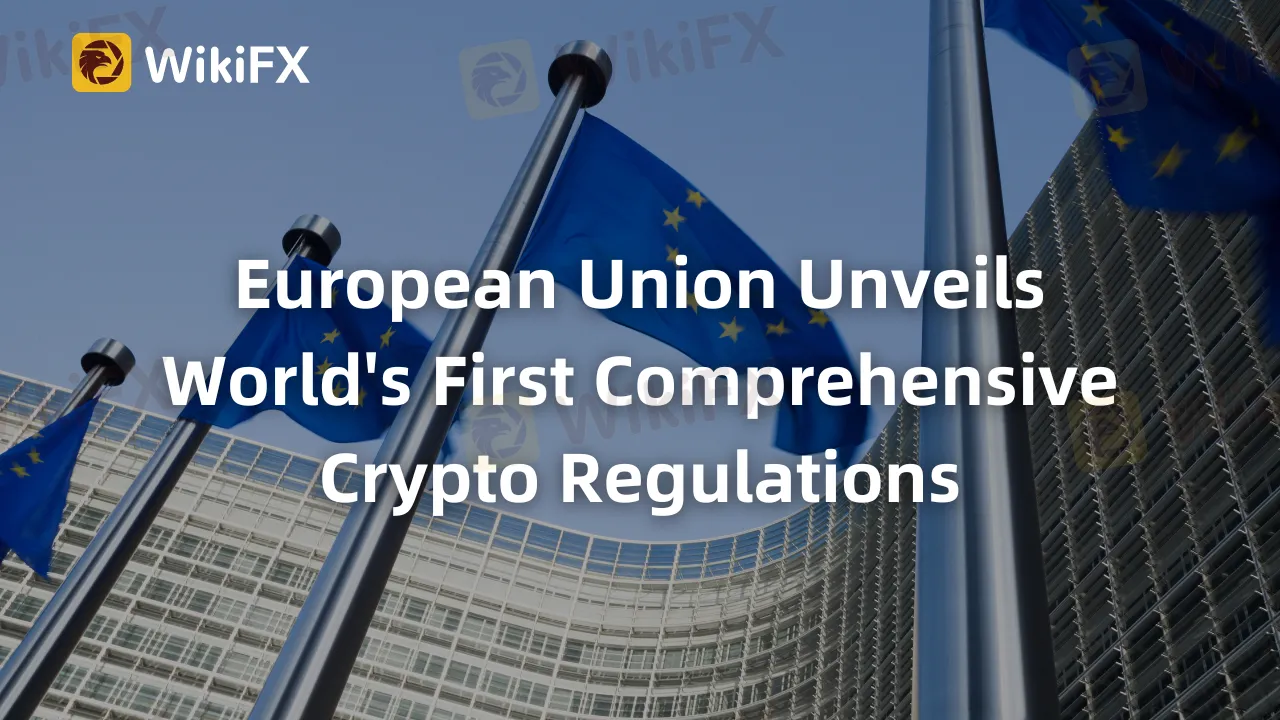简体中文
繁體中文
English
Pусский
日本語
ภาษาไทย
Tiếng Việt
Bahasa Indonesia
Español
हिन्दी
Filippiiniläinen
Français
Deutsch
Português
Türkçe
한국어
العربية
European Union Unveils World's First Comprehensive Crypto Regulations
Abstract:The European Union (EU) has endorsed the world's first comprehensive cryptocurrency regulations, requiring crypto-related firms to obtain a license. The new rules, designed to prevent money laundering and tax evasion, make crypto transactions traceable and mandate data sharing on tax rulings.

In an unprecedented move, European Union (EU) member states collectively endorsed the world's first holistic set of regulations for cryptocurrency assets on Tuesday. This pivotal decision is likely to incite countries such as the United States and the United Kingdom to accelerate their crypto regulatory efforts.
The crucial approval came during a meeting of EU finance ministers in Brussels, following a rigorous negotiation process with the European Parliament, which sanctioned these regulations in April. The urgency to regulate the crypto sector has been accentuated by the recent downfall of the FTX cryptocurrency exchange.
Elisabeth Svantesson, the Finance Minister for Sweden, which currently presides over the EU, underscored the vital importance of these regulations. “The necessity for introducing protective measures for European citizens invested in these assets and curtailing the exploitation of the crypto sector for money laundering and terrorist financing has been starkly highlighted by recent incidents,” she stated.
The newly approved regulations necessitate that any firm aiming to issue, trade, or safeguard crypto-assets, tokenized assets, and stablecoins within the 27-nation bloc obtain a license. The rules are an effort to provide a comprehensive framework for the burgeoning crypto sector, offering much-needed clarity for companies operating in this space.
In a bid to prevent tax evasion and money laundering using crypto-assets, the ministers have agreed to make these transactions more traceable. As of January 2026, service providers will be required to obtain the names of both senders and recipients involved in crypto-asset transactions, irrespective of the transaction amount.
Further, an agreement was reached on modifying the rules governing how member states cooperate on taxation matters to include transactions involving crypto-assets. This includes the exchange of information on advance tax rulings for the wealthiest individuals.
Crypto firms have long sought regulatory certainty, and the EU's move is likely to put pressure on other countries to adopt similar rules, and on global regulators to develop universal norms for cross-border transactions.
Meanwhile, the United Kingdom has proposed a phased regulatory approach, initially targeting stablecoins before expanding to un-backed crypto-assets at a later stage, though a concrete timeline is yet to be set.
The United States, on the other hand, has been focusing on the use of existing securities rules for enforcement actions in the sector while deliberating on whether to introduce specialized new rules and the bodies that would enforce them.
Hester Peirce, a commissioner at the U.S. derivatives regulator CFTC, acknowledged last week that numerous federal and state authorities are wrestling with determining their potential oversight role in the crypto sector. “We are wandering in the desert a bit,” Peirce confessed at a conference.
The EU's landmark decision on crypto regulation not only sets a new standard for the union itself but also presents a challenge to the global community to catch up. It remains to be seen how other nations will respond to this wake-up call.
Download and install the WikiFX App on your smartphone to stay updated on the latest news.
Download the App here: https://social1.onelink.me/QgET/px2b7i8n

Disclaimer:
The views in this article only represent the author's personal views, and do not constitute investment advice on this platform. This platform does not guarantee the accuracy, completeness and timeliness of the information in the article, and will not be liable for any loss caused by the use of or reliance on the information in the article.
Read more

Which Zodiac Sign Makes the Best Trader?
It’s often said that when money is at stake, the true nature of human character—both its brilliance and darkness—is revealed. Trading is one such arena where greed, hesitation, courage, and decisiveness come into play. Successful trading requires more than fundamental and technical analysis skills; a deep understanding of one’s personality is equally crucial. Different zodiac signs exhibit unique personality traits—can these traits influence investment returns? Keep reading to find out which zodiac sign makes the best trader!

Why Are 50,000 Traders Returning to Hong Kong Markets?
Know why 50,000 retail traders reactivated in Hong Kong. Learn how AI tools, mobile apps, and global strategies drive this market revival and investor growth.

Why Copy Trading is Perfect for New Investors
Learn why copy trading is ideal for new investors. Follow expert traders, minimize risks, and start earning confidently—no prior expertise is required.

What Every Trader Must Know in a Turbulent Market
The global financial markets are no strangers to periods of uncertainty, and recent weeks have been a testament to their unpredictable nature. Heightened volatility across major indices, including the US stock market, has left traders reassessing their strategies as they face both opportunities and risks.
WikiFX Broker
IC Markets Global
EC Markets
AvaTrade
Doo Prime
FOREX.com
OANDA
IC Markets Global
EC Markets
AvaTrade
Doo Prime
FOREX.com
OANDA
WikiFX Broker
IC Markets Global
EC Markets
AvaTrade
Doo Prime
FOREX.com
OANDA
IC Markets Global
EC Markets
AvaTrade
Doo Prime
FOREX.com
OANDA
Latest News
IG Japan Extends US Stock CFD Trading Hours in 2025
ALERT! Warning against Livaxxen
Which Zodiac Sign Makes the Best Trader?
Plus500 Collaborates with Topstep, Prop firm
Will Gold Prices Continue to Rise Due to Trump’s Tariffs?
Miami Firm Owner Pleads Guilty to $6M Ponzi Scheme Fraud
NBI Cebu Arrests Forex Trader for Illegal Investment Solicitation
PU Prime's "Feather Your Trades" Contest! Begin
eToro Files for IPO with $5 Billion Valuation on NASDAQ
Is FizmoFX a Scam? Fraud and Account Suspension of Traders
Currency Calculator


